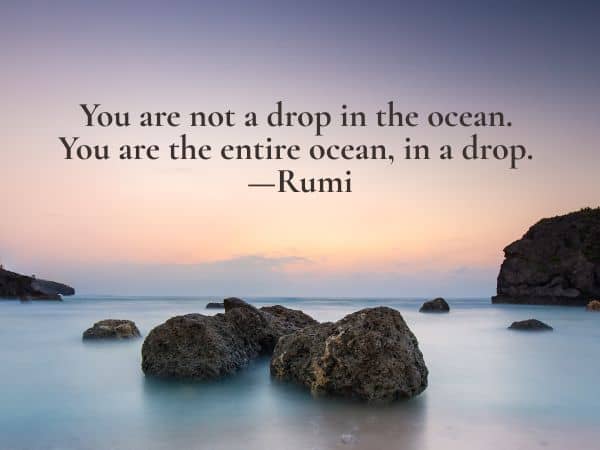Is God relevant to you if you are on the spiritual path? There may be a misconception that we don’t have to believe, worship or build a connection with God if we identify as being spiritual rather than religious.
But religion and spirituality are not different in their essence and goal.
All true religions are based on the spiritual truth of unity or oneness. What this means is that there is faith in one, infinite divine essence expressing in all things and beings. This oneness is presented as one God.
Both spirituality and religion have the same goal— to realise and become one with this divine essence.
Religion has many names for God such as the Lord, Almighty, Krishna, Vishnu, Rama, Allah, Jehovah and others. Spirituality uses more abstract terms such as Supreme Truth, Source, Pure Consciousness, and Ultimate Reality.
These days, it’s common to hear of terms such as the Universe, Nature or the Higher Self.
Religion often projects God as a higher power separate and different from us.
Whereas spirituality tells us that God is our own Higher Self. In fact, this Higher Self is our real nature or identity.
We are far bigger than our small personality identity. Spiritual teachings such as Vedanta present a shocking and wondrous truth.
We are spirit, the Self, the divine essence in all things and beings everywhere.
 This idea is beautifully captured by the Sufi poet-philosopher, Rumi. He says, “You are not a drop in the ocean. You are the entire ocean in a drop”.
This idea is beautifully captured by the Sufi poet-philosopher, Rumi. He says, “You are not a drop in the ocean. You are the entire ocean in a drop”.
How do we go from our current state of smallness to the vastness of our real nature? We could start with building a connection with God.
Daily habits that build a connection with God
#1 Convert your everyday actions and work into worship
We keep busy all day long doing one thing or another. We get so carried away in our busyness that we forget the divinity in us, and all around us that sustains our lives and enables us to do all that we do.
None of us created this world, the natural resources and forces in it like water, air, fire, trees, land and living creatures that we depend on. We also cannot take responsibility for creating our bodies, senses and faculties. These have all been gifted to us from a benevolent Universe.
When we reflect deeply on these facts, we feel a sense of gratitude towards the Source that enables our existence and activities. A desire to express that gratitude naturally follows.
How do we express those feelings?
Since our faculties and blessings come from the Divine, we can mentally dedicate our actions back to It.
To do this, we must first build a connection with God.
Connections grow from spending time and sharing experiences. Just as two people who love and care for each other, call or text several times in a day, we too can remember the Divine and offer up our actions to It as we go about our day.
This will create a habit of remembering our blessings and build a deeper connection with God at the same time.
For example, when taking a shower, we can be grateful for the water that is nature’s miracle. When working with our hands, we can wonder at the innumerable things the hands can do. A habit that is common in many traditions is saying a prayer of gratitude before meals.
In this way, even mundane everyday actions will be elevated to acts of worship.
Now, there’s something more to be said about this practice. While staying aware and remembering our blessings throughout the day is a beautiful habit, it can be challenging. We usually get absorbed in what we are doing and easily forget.
To transition to frequent remembering, we can begin with practicing this dedication while doing our daily, obligatory duties. Doing our duties helps us grow on our spiritual path if we do them with the right attitude.
The Vedic masters formulated the principles of Karma Yoga for this purpose. It’s the art of doing right actions with the right attitude.
The word, “karma” means “action” and “yoga” comes from the Sanskrit root word, yuj which means “to unite.” Any path or means to re-connect (unite) with God, the divine Self within is called a yoga.
The 4 principles of Karma Yoga
1. Do your duty.
The right actions are our duties. We should never neglect doing our duties even if they are difficult, time-consuming or inconvenient.
Our duties come to us based on our role and position in life. They help us outgrow our self-centred tendencies because they are done mostly for others.
For example, an employee works for the sake of her company, organisation or cause; a teacher helps to educate others, and parents do their duties to support their family,
Duties are an effective means to mature inwardly. This is why they must never be left undone.
2. Do your duties to the best of your ability.
Duties must be done in the best way we can. They should not be left half-done, done shoddily or hurriedly just to get them done. If we put in our best while performing our duties, a sense of satisfaction comes from the work itself.
Then, we don’t have to wait to gain satisfaction from the results of our actions which are unpredictable.
 3. Do your duties a worship of God.
3. Do your duties a worship of God.
This is the attitude of gratitude which will convert work into worship. This is what makes ordinary actions into a yoga—a means to grow spiritually. And it is this very same attitude that will build a deeper connection to God.
A simple, “For you” is all that it takes. Formal prayers are not necessary.
4. When the results come, accept them cheerfully as a gift or blessing from God.
We always act to achieve desirable results. This is a natural tendency and there is nothing wrong in it. It is the desire for results that motivates us to start working in the first place.
However, to have the results in mind while we work, drains our focus and energy.
Allowing our attention to dissipate into future hopes and expectations only sabotages our efforts in the now
A spiritual seeker who dedicates her work to God naturally considers the results as a gift from the altar of her dedication. She accepts them cheerfully no matter what she gets.
She is the happiest because she derives her fulfillment from the work itself and not from the results.
#2 Associate your relationships with God
Our everyday attachments to things and people keep our focus of attention exclusively on the outer world.
We are preoccupied with ourselves, our work, partners, spouses, children, other family members and friends. Our love also embraces our possessions such as our homes and cars.
What we forget is that everything and everyone will be left behind when we die. But our relationship with God who is our essential nature, never dies.
 Let’s take the relationship between the waves and the ocean to explain this point.
Let’s take the relationship between the waves and the ocean to explain this point.
Waves emerge from the ocean, appear for some time and then die away into the ocean.
The waves were never separate from the ocean, their source. In fact, they were nothing but the ocean expressing in different forms.
Imagine yourself to be like a wave, building relationships with other waves (or people, in this case).
Some people come and go; others remain in your life for a longer period. Some relationships are happy, others not-so-happy.
Regardless of the types of people and the relationships we had with them, they all disappear like an illusion when the body dies.
Just as the only permanent relationship that waves can have is with the ocean, the only permanent relationship that we have is with God, our Source.
Relationships undoubtedly do bring us joy. But it doesn’t make sense to form clinging attachments to our fellow “waves”. It is a strategy that will surely backfire on us as relationships are always changing and as no one remains permanently in our lives.
Our attachments to the people in or lives can be thought of as many unseen threads that tie us to them.
To loosen the ties and to build a connection with God, we can “tie up’” or associate every relationship with the divine.
For example, seeing the love in the eyes of your dear ones, you could lift your attention in gratitude to the divine for having them in your life.
When dealing with difficult relationships, we could uplift ourselves by understanding that these people were brought into our lives by the intelligent universe for a higher good.
They are like mirrors that show us hidden aspects of ourselves. our erroneous notions, false expectations, negative habits and behaviours.
It pays to see the divine hand in the people and circumstances of our lives. They are opportunities to learn about ourselves and evolve spiritually.
When we keep a focus on building a deeper connection with God by associating all our relationships with It, it will help us to grow in faith and be better able to handle the challenges and pain that can come from them.
The drop will come to realise its oneness with the ocean
The knowledge shared in this article is not new. It has been taught to us by both religious and spiritual teachers.
It is practical advice for the two main areas of life that we spend most of our time on—everyday activities and duties, and our relationships.
As we build a connection with God by dedicating our actions and seeing a higher purpose in our relationships, it will anchor our mind increasingly in the Divine. This will help to buffer our minds against the inevitable loss and sorrow in life.
Living a God-centred life will eventually take us to the spiritual goal of achieving oneness with the infinity within us.
Then, we will come to have a deep and personal experience of what the poet Rumi expressed so beautifully—The drop will come to know itself as the ocean.
Like this post? Sign up for the free fortnightly Spiritual Solutions Newsletter and receive the latest articles, news and updates in your email inbox













